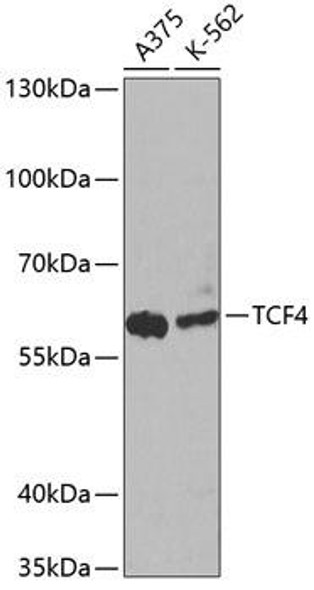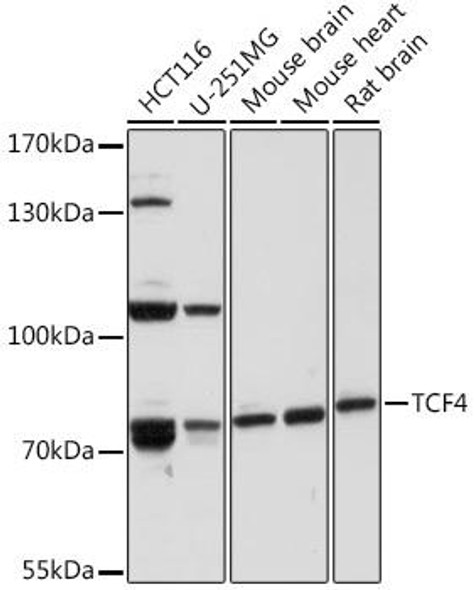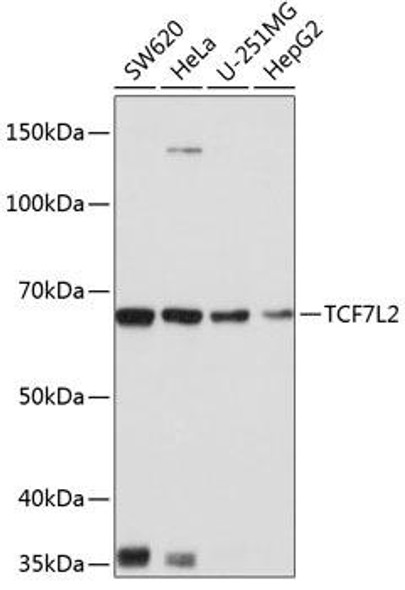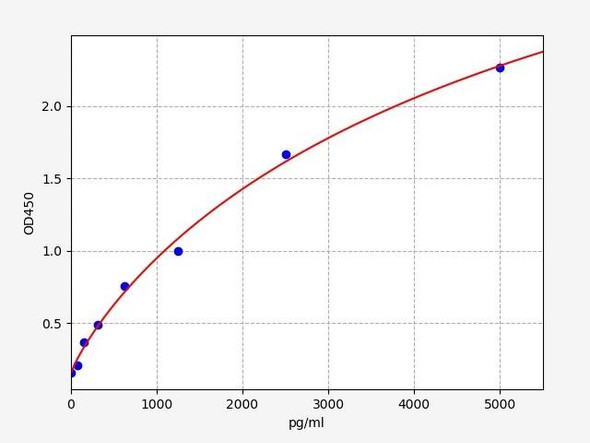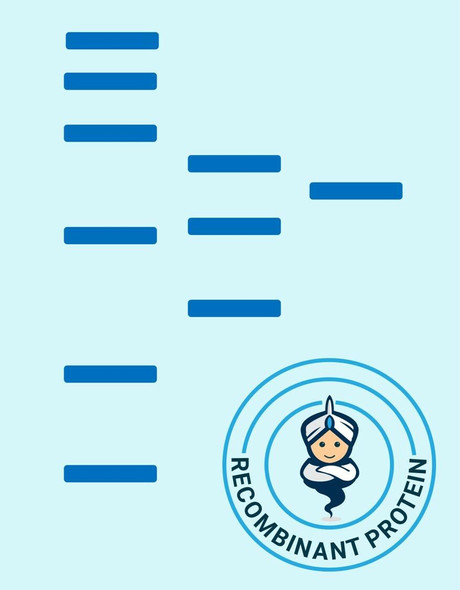Description
TCF4/TCF12 Antibody (PACO22656)
The TCF4/TCF12 Antibody (PAC022656) is a valuable tool for researchers studying the TCF4 and TCF12 proteins, both of which are transcription factors involved in regulating gene expression. This polyclonal antibody, raised in rabbits, is highly specific and reactive to human samples, making it ideal for use in Western blot applications.TCF4 and TCF12 are key players in various cellular processes, including embryonic development, cell differentiation, and cell proliferation. Dysregulation of these transcription factors has been implicated in diseases such as cancer and developmental disorders, making them important targets for research.
By utilizing the TCF4/TCF12 Antibody, researchers can gain insights into the functions of these proteins and their role in disease pathogenesis. This antibody enables the detection and analysis of TCF4 and TCF12 in different cell types, providing a valuable tool for studies in molecular biology, developmental biology, and cancer research.
| Antibody Name: | TCF4/TCF12 Antibody (PACO22656) |
| Antibody SKU: | PACO22656 |
| Size: | 100ul |
| Host Species: | Rabbit |
| Tested Applications: | ELISA, WB |
| Recommended Dilutions: | ELISA:1:2000-1:10000, WB:1:500-1:3000 |
| Species Reactivity: | Human, Mouse, Rat |
| Immunogen: | Synthesized peptide derived from internal of human TCF4/12. |
| Form: | Liquid |
| Storage Buffer: | Rabbit IgG in phosphate buffered saline (without Mg2+ and Ca2+), pH 7.4, 150mM NaCl, 0.02% sodium azide and 50% glycerol. |
| Purification Method: | The antibody was affinity-purified from rabbit antiserum by affinity-chromatography using epitope-specific immunogen. |
| Clonality: | Polyclonal |
| Isotype: | IgG |
| Conjugate: | Non-conjugated |
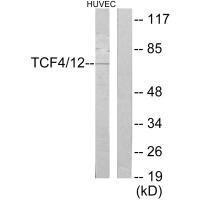 | Western blot analysis of extracts from HUVEC cells, using TCF4/12 antibody. |
| Background: | Transcription factor that binds to the immunoglobulin enchancer Mu-E5/KE5-motif. Involved in the initiation of neuronal differentiation. Activates transcription by binding to the E box (5'-CANNTG-3'). Binds to the E-box present in the somatostatin receptor 2 initiator element (SSTR2-INR) to activate transcription By similarity. Preferentially binds to either 5'-ACANNTGT-3' or 5'-CCANNTGG-3'. |
| Synonyms: | Class A helix-loop-helix transcription factor ME2; ITF-2; ITF2; Immunoglobulin transcription factor 2; MITF-2 |
| UniProt Protein Function: | TCF4: Transcription factor that binds to the immunoglobulin enchancer Mu-E5/KE5-motif. Involved in the initiation of neuronal differentiation. Activates transcription by binding to the E box (5'-CANNTG-3'). Binds to the E-box present in the somatostatin receptor 2 initiator element (SSTR2-INR) to activate transcription. Preferentially binds to either 5'-ACANNTGT-3' or 5'-CCANNTGG-3'. Efficient DNA binding requires dimerization with another bHLH protein. Forms homo- or heterooligomers with myogenin. Interacts with HIVEP2. Interacts with NEUROD2. Expressed in adult heart, brain, placenta, skeletal muscle and to a lesser extent in the lung. In developing embryonic tissues, expression mostly occurs in the brain. 3 isoforms of the human protein are produced by alternative splicing. |
| UniProt Protein Details: | Protein type:DNA-binding; Transcription factor Chromosomal Location of Human Ortholog: 18q21.1 Cellular Component: transcription factor complex; nucleus Molecular Function:protein C-terminus binding; protein binding; DNA binding; protein heterodimerization activity; transcription factor activity Biological Process: transcription initiation from RNA polymerase II promoter; positive regulation of transcription, DNA-dependent; transcription initiation; positive regulation of transcription from RNA polymerase II promoter; positive regulation of neuron differentiation; protein-DNA complex assembly Disease: Corneal Dystrophy, Fuchs Endothelial, 3; Pitt-hopkins Syndrome |
| NCBI Summary: | This gene encodes transcription factor 4, a basic helix-loop-helix transcription factor. The encoded protein recognizes an Ephrussi-box ('E-box') binding site ('CANNTG') - a motif first identified in immunoglobulin enhancers. This gene is broadly expressed, and may play an important role in nervous system development. Defects in this gene are a cause of Pitt-Hopkins syndrome. Multiple alternatively spliced transcript variants that encode different proteins have been described. [provided by RefSeq, Aug 2011] |
| UniProt Code: | P15884 |
| NCBI GenInfo Identifier: | 3915747 |
| NCBI Gene ID: | 6925 |
| NCBI Accession: | P15884.3 |
| UniProt Secondary Accession: | P15884,B3KT62, B3KUC0, B4DT37, B4DUG3, B7Z5M6, B7Z6Y1 G0LNT9, G0LNU0, G0LNU1, G0LNU2, G0LNU4, |
| UniProt Related Accession: | P15884 |
| Molecular Weight: | 48,098 Da |
| NCBI Full Name: | Transcription factor 4 |
| NCBI Synonym Full Names: | transcription factor 4 |
| NCBI Official Symbol: | TCF4 |
| NCBI Official Synonym Symbols: | E2-2; ITF2; PTHS; SEF2; ITF-2; SEF-2; TCF-4; SEF2-1; SEF2-1A; SEF2-1B; SEF2-1D; bHLHb19 |
| NCBI Protein Information: | transcription factor 4; SL3-3 enhancer factor 2; transcription factor 4, isoform C; transcription factor 4, isoform D; transcription factor 4, isoform E; transcription factor 4, isoform R; immunoglobulin transcription factor 2; class B basic helix-loop-helix protein 19 |
| UniProt Protein Name: | Transcription factor 4 |
| UniProt Synonym Protein Names: | Class B basic helix-loop-helix protein 19; bHLHb19; Immunoglobulin transcription factor 2; ITF-2; SL3-3 enhancer factor 2; SEF-2 |
| Protein Family: | Transcription factor |
| UniProt Gene Name: | TCF4 |
| UniProt Entry Name: | ITF2_HUMAN |
| Antibodies |
| TCF4/TCF12 Antibody (PACO01598) |
| Secondary Antibody |
| Anti-HRP Goat Anti-Rabbit IgG (H+L) Antibody (CABS014) |
| Recommended Products |
| Anti-FITC Goat Anti-Rabbit IgG (H+L) Antibody (CABS011) |
| Anti-HRP-conjugated Beta Actin Antibody (CABC028) |




